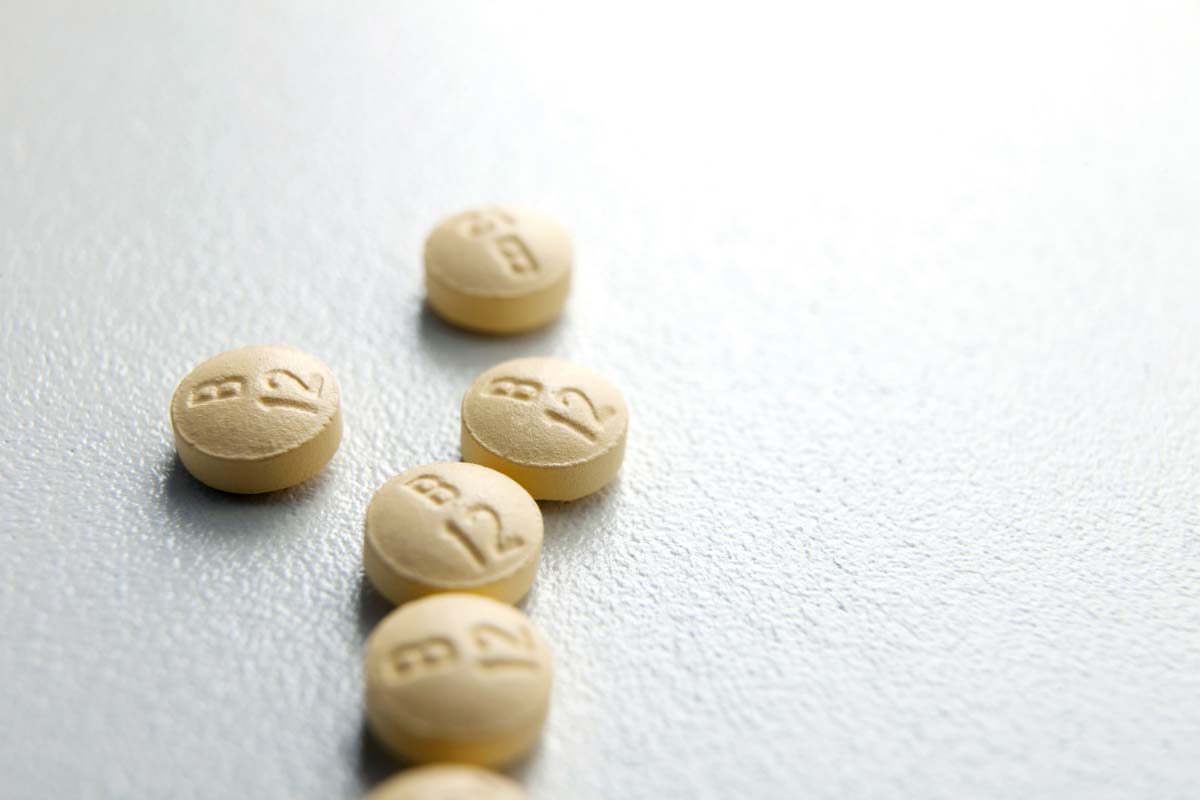Vitamin B12, also known as cobalamin, is a water soluble vitamin that can reduce cancer, protect red blood cells and improve energy. The foods which provide you with the most vitamin B12 are meat, fish, eggs, shellfish, and milk but you can also take vitamin B12 as a supplement (1, 2, 3).
A lot of vitamin B12 deficiencies are not caused by a lack of vitamin B12 though, it is from malabsorption. This can be caused by certain medications, or conditions such as atrophic gastritis, pernicious anemia Crohn’s disease, or Celiac disease (4, 5, 6, 7).
Best Vitamin B12
1. Transparent Labs Vitamin B-Complex
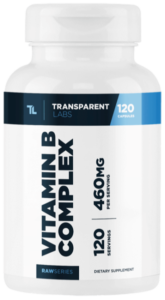
While most vitamin B12 supplements only provide a singular nutritional supplement, the vitamin B complex by Transparent Labs offers not only one supplement, but eleven. This B12 supplement contains vitamin C, Folic Acid, and Biotin among others.
Additionally, Transparent Labs provides an all-natural GMP certified product that is both gentle and safe for consumers. For these reasons, it’s our #1 pick.
2. Nature Made B12 Timed Release
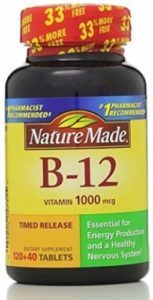
Being one of the most trusted brands in the supplement industry, Nature Made’s vitamin B12 supplement comes in tablet form. When taken, the tablet’s contents are released into the bloodstream over time. This prevents the necessity of constant doses and also helps the body to process the vitamin appropriately.
Aside from the gentler approach to supplementation, Nature Made also brings with it an all-natural product featuring no artificial colors, flavors, or ingredients.
3. Twinlab B12 Dots
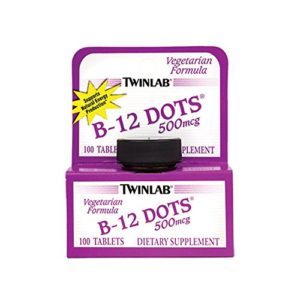
In line with their innovative products, the Twinlab B12 supplement is offered in the form of dissolvable micro–tablets.
Additionally, Twinlab’s supplement comes with both a GMP certification, as well as the certification of scientific product research. Not only is this a natural option, but it is affordably priced to meet the needs of multiple consumers.
4. Jarrow Formulas Methylcobalamin
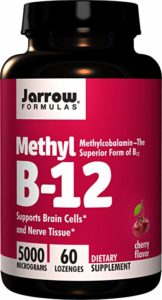
Jarrow Formulas’ B12 supplement touts a high degree of bioavailability. The coenzyme form used allows for a higher degree of bioavailability and acceptance in the bloodstream.
This chewable tablet comes in a natural cherry – flavor that is both common and appealing. Both highly rated and approved, this B12 option provides a high – degree of quality at a very affordable and reasonable price.
5. Nature’s Bounty Vitamin B12

This sublingual liquid is not only fast – acting, but comes with the backing of laboratory test results readily available to consumers.
For additional convenience, consumers can purchase this vitamin B12 option in multiple sizes, with all-natural ingredients. The natural berry flavor used makes for a great option to use for both children and adults alike.
6. Garden of Life B12 Vitamin – Mykind Liquid
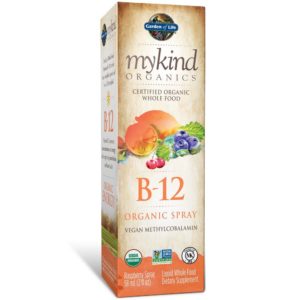
While there are a great number of tablets available for B12 supplementation, those choosing this option will find a sprayable liquid at their disposal. Each use of the spray provides 500 micrograms of vitamin B12.
The raspberry flavoring makes it an enticing option for not only adults but children as well. Additionally, Garden of Life provides an option friendly for multiple lifestyles including vegan, vegetarian, and even Kosher.
7. Natrol Vitamin B12 Dissolvable Tablets
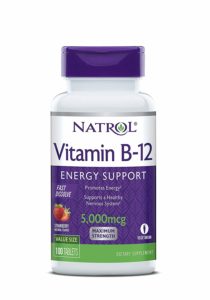
Natrol has taken the concept of individualism one step further by providing a vitamin B12 supplement that is dissolvable. This dissolvable option allows you to supplement vitamin B12 levels with no water necessary for added convenience.
Not only is the supplement fantastic in terms of easy usage, but it is also made from all-natural ingredients and sweeteners to give a pleasant taste. All of the ingredients used for this product are 100% vegetarian.
8. EZ Melts B12 Methylcobalamin
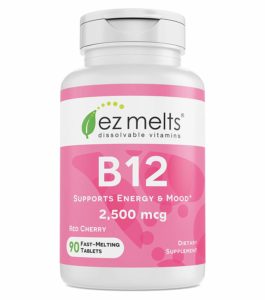
Manufactured with a fast-acting formula that takes effect within minutes, the EZ melt product is a great choice for easy use and convenience.
This product is not only one of the easiest to use but also promotes an all-natural formula. Soy-free, dairy-free and GMO-free, the ingredients used are sourced from fully sustainable options.
9. Vitafusion Extra Strength Vitamin B12
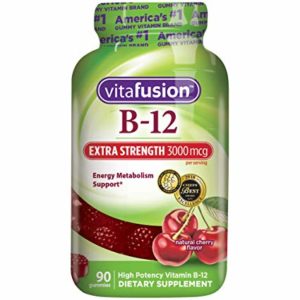
The gummy form allows for convenience and the ability to take your supplement anywhere at any time.
For those concerned about possible additives or preservatives, this B12 supplement contains nothing but all-natural ingredients, including sweeteners. With no synthetic dyes, high – fructose corn syrup, gluten, or dairy, there are multiple people and lifestyles who will find a great deal of value in this product.
10. Global Healing Center VeganSafe B-12
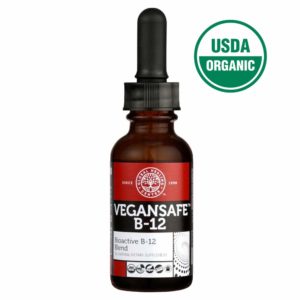
Though not manufactured by one of the better – known brands, Global Healing Center’s B12 supplement provides a great option for those looking for a vegan-friendly and organic supplement.
Additionally, this B12 option is available in two sizes and comes with a coenzyme blend for greater absorbability and efficacy. This supplement Is also USDA certified and friendly for almost any and all dietary needs.
How We Rank
When ranking vitamin B12 supplements, the first thing we looked at was a product’s serving size and dosage. Studies show that vitamin B12 is optimal at a minimum of 500mcg/serving. Our top pick, Transparent Labs, provides double that at 1000mcg/serving.
We also looked for B-12 only instead of complex B vitamins, since this ranking is for vitamin B-12 supplements. We have a separate ranking for those complex vitamins.
The next we looked at was the delivery method of the vitamin B-12 supplement. Capsules and tablets were preferred due to the accuracy in dosing (as long as there are minimal to no fillers, like NatureMade and TwinLabs).
With a liquid dropper, you usually need to eyeball the amount, which can cause variance in daily doses, especially for the elderly.
Gummies, like Vitafusion, were ranked lower because they often contain artificial sweeteners and dyes, which are not the best for the human body.
After this point, we had our final rankings: the best B12 supplements on the market.
Benefits
1. Vitamin B12 may help to reduce cancer risk when combined with folate and vitamin B6. The evidence supporting the idea that vitamin B12 can reduce cancer risk is mixed. While some studies found that vitamin B12 is inversely associated with cancer risk, other studies found no such evidence (8, 9).
A study on Mexican women in 2006 found that high intakes of folate and vitamin B12 led to a decreased risk of breast cancer, particularly in postmenopausal women (10).
It seems that there is some evidence that vitamin B12 does have some effect on certain cancers, but there isn’t enough evidence to say definitively either way. In fact, as we will explore in the side effects section, vitamin B12 may even increase the risk of certain cancers.
2. Vitamin B12 can help reduce birth defect risk when taken by pregnant women. A lot of studies in India (where vitamin B12 deficiency is common) have found that low vitamin B12 levels during pregnancy can lead to birth defects (11).
It can also contribute to early birth. This can be caused by raised Homocysteine levels, which can lead to a lower birth rate and an increased risk of type II diabetes in the child (12).
Taking a vitamin B12 supplement can help to reduce the risk of birth defects, low birth rate, or premature births by reducing Homocysteine levels in the blood (13).
Vitamin B12 also creates nucleic acid which is used to form DNA (14).
3. Vitamin B12 can reduce inflammation. High levels of homocysteine can lead to inflammation of the blood vessels which can lead to coronary heart disease. A 2013 study on elderly people with poor vitamin B12 levels found that vitamin B12 supplementation could reduce homocysteine levels and “normalize biomarkers of deficiency” (15).
4. Vitamin B12 can increase red blood cell production. Vitamin B12 can combine with folic acid (also known as folate or vitamin B9) to help produce red blood cells and it can also improve the function of iron in the body (16, 17).
This can have many benefits, particularly in athletes. Exercise can actually decrease red blood cell mass through “mechanical rupture when red blood cells pass through the capillaries in contracting muscles” (18).
Increasing red blood cell count can help to fight this, and can also help to improve cardiovascular performance by increasing the amount of oxygen that can be transported throughout the body. Increased red blood cell production will also help combat anemia.
5. Vitamin B12 injections are used to treat chronic fatigue syndrome. Studies have shown that vitamin B12 can treat chronic fatigue syndrome by functioning as a nitric oxide scavenger (19).
This can also be attributed to the effect it has on Homocysteine. Another study found that patients with fibromyalgia and chronic fatigue syndrome had increased concentrations of homocysteine in their blood (20).
By reducing Homocysteine levels in the blood, vitamin B12 may help to reduce fatigue.
6. Your digestion can be improved by vitamin B12. Studies have shown that vitamin B12 can help improve digestion by contributing to the “structure and function of human gut microbial communities” (21).
In other words, vitamin B12 can help with healthy gut bacteria production which improves digestion. The study describes it as “a precious resource in the gut”.
7. Vitamin B12 may help to improve cognition. While some studies have demonstrated an improvement in cognition in people taking vitamin B12 as a supplement, others have found no evidence linking the two.
A 2003 study in the Cochrane Database of Systematic Reviews found no evidence that “folic acid, with or without vitamin B12, has a beneficial effect on cognitive function or mood or the health of cognitively impaired older people” (22).
But the study conceded that much more research is required.
In 2011 a cross-sectional examination of vitamin B12, cognition, and brain MRI measures found that Methylmalonate (a marker of vitamin B12 deficiency) could negatively affect cognition (23).
This means that vitamin B12 supplementation may improve cognition, but only in people who are already deficient.
Taking vitamin B12 supplementation without a deficiency should have no effect on cognition.
Lots of studies have found that vitamin B12 deficiency is a possible cause of dementia and cognitive decline in the elderly. A 2000 study concluded that anyone suffering from cognitive impairment should be checked for vitamin B12 deficiency (24).
This suggests that vitamin B12 supplementation could help to treat these conditions.
8. Low vitamin B12 levels have been linked to depression. A study in 2000 found that a “metabolically significant vitamin B12 deficiency” was associated with a large increase in the risk of severe depression (25).
This demonstrates that taking vitamin B12 to treat a deficiency could also help treat depression, provided that the depression was caused by a vitamin B12 deficiency.
This does not mean that vitamin B12 supplementation is a cure for depression though, and it is important to make that distinction. But studies still indicate that it is worth increasing folate and vitamin B12 intake in people who are suffering from depression (26).
Another study found that increasing folate and vitamin B12 levels may help to treat people suffering from depression who have not responded to antidepressant treatment (27).
Most studies link the effectiveness of vitamin B12 supplementation to the effect it has on homocysteine which seems to be a potential cause of depression.
9. Increased vitamin B12 levels may help stroke patients recover. A study into the effects of vitamin B12 supplementation on patients with lacunar stroke found that high doses of vitamin B12 led to an improvement in verbal learning (28).
It seems that the main benefits of vitamin B12 supplementation are reserved for people who are deficient in it or are suffering from malabsorption due to other conditions. People who have sufficient vitamin B12 through diet will see no additional benefits. Almost all of these benefits can be attributed to the effect of vitamin B12 on homocysteine levels in the blood.
Reducing this seems to lead to improved mood and cognition, as well as a reduction in birthing problems, chronic fatigue, and cancer risk. Getting vitamin B12 through diet seems to be the most effective way to remove the risk of deficiency, but for vegetarians and vegans this is not always possible.
The avoidance of animal products can easily lead to a deficiency, which explains why large parts of India (where vegetarianism is common) suffer from vitamin B12 deficiency.
10. Vitamin B12 could help in the prevention of dementia and memory loss. Of the many possible side effects seen from a lack of vitamin B12, one of the most substantial is the effects commonly seen in the brain. Scientific research suggests vitamin B12 has a role to play in the reduction of memory loss, especially in older adults.
Most notably, vitamin B12 has been shown to prevent brain atrophy, more commonly known as the loss of neurons in the brain. This is most often seen with memory loss or dementia. Though more research will be helpful in determining the concrete validity of this information, some studies have strongly suggested the correlation between vitamin B12 and the brain is significant.
According to a study conducted in 2016, chose test subjects suffering from early-stage dementia. During the course of the study, test subjects were given supplements of vitamin B12 and omega 3-fatty acids. The resulting mental decline was slowed by approximately 30% over several months (29).
An additional study showed that lower levels of vitamin B12 may also contribute to memory loss and, eventually, dementia. In 2016, test subjects experiencing mild cognitive impairment were provided with supplements of vitamin B12 (30).
Over the course of several months, memory and cognitive functionality improved approximately 48% among those receiving the supplements.
As with most research, studies to date have been fairly minimal so more testing would be needed to come to concrete and definitive proof. If you are experiencing issues with memory or cognitive functionality, it is highly recommended that you seek medical attention prior to beginning a vitamin B12 regimen.
11. Vitamin B12 may reduce the risk of macular degeneration. Though not commonly known, macular degeneration is the leading cause of permanent, irreversible vision loss in people over the age of 60.
This condition occurs when the macula, the small central portion of the retina, deteriorates. The retina is the light-sensing nerve tissue at the back of the eye. Once this has occurred, though not usually blinding, the result is usually non-reversible. Maintaining adequate levels of vitamin B12 may help prevent the risk of age-related macular degeneration.
Scientific research has shown that supplementing a healthy diet with vitamin B12 may lower homocysteine, a type of amino acid found in the body’s bloodstream. As previously discussed, elevated levels of homocysteine can have extremely detrimental effects on the performance of the human body. This is equally true of the risk of macular degeneration.
According to a scientific study completed in 2010, supplementing vitamin B12, along with folic acid and vitamin B6, may reduce this risk. During the study, 5,000 women over the age of 40 were tested to evaluate the effects of taking a vitamin B12 supplement.
Those who received the supplements over seven years had fewer cases of macular degeneration than those who had been given a placebo. In total, the risk of developing any form of macular degeneration decreased by 34%, while it was also 41% lower for more severe types (31).
Though this particular study and others have shown the importance of vitamin B12 on a large scale, there are still additional studies needed to come to concrete conclusions regarding the long-term effects of vitamin B12. For now, however, it is recommended that patients consume enough vitamin B12 in their diets to ensure any possible benefits are received.
12. Vitamin B12 could help in the prevention of deep vein thrombosis. While it would seem odd to have any connection between a vitamin and conditions such as deep vein thrombosis, scientific research has shown that a deficiency in Vitamin B12 could lead to very deadly conditions.
Deep vein thrombosis is a slightly common condition, affecting almost 200,000 people in the United States annually. This particular condition occurs when blood clots form in a deep vein. This could occur in multiple places within the body including both the arms and legs. Most blood clots, however, form in the lower leg or thigh.
The primary danger seen with this condition is the possibility of the blood clot breaking loose. If the blood clot breaks from its original site, there is a high chance it may travel through the body and arrive in the lungs, causing a potentially deadly effect.
Vitamin B12 has been linked to maintaining the number of homocysteine levels, its presence, or the lack thereof can determine whether or not this potentially becomes an area of concern. If levels of vitamin B12 continue to be low, patients may experience Hyperhomocysteinemia. Ultimately, this could lead to blood cell clotting and thus cause deep vein thrombosis.
To avoid this, it is recommended that an adequate amount of vitamin B12 combined with folate be taken regularly.
13. Vitamin B12 intake provides an extra boost of energy. Traditionally, vitamin intake has always been looked at for possible health benefits. Though immunity is often at the forefront of discussion, a boost in energy is also another prominent possibility when it comes to vitamin supplementation.
Vitamin B12 has long been touted as a great product for a boost in energy. Though vitamins, in general, play a vital role in the process of energy production, they themselves do not actually provide the energy increase. Rather, they work to support the processes within the body responsible for the increase in energy.
While those with sufficient levels of vitamin B12 may not see an increase in energy if they choose to supplement, those with lower levels or deficiencies may find a very different result. This is mostly due to vitamin B12 being a water-soluble vitamin. As the body cannot store extra amounts of the vitamin, any excess is passed through the body via urine.
For those who have experienced marked fatigue, one of the first sources of assistance should be an increase in their vitamin B12 levels. This should always be followed up with a visit to your physician or primary care physician, however, to avoid any unforeseen conditions or circumstances.
Side Effects
1. Increased prostate cancer risk. A 2004 study was designed to investigate the effectiveness of folate and vitamin B12 at protecting the body against prostate cancer. Instead of finding any evidence to support this, the researchers actually found a three-fold increase in risk associated with vitamin B12 intake.
They even suspected that vitamin B12 could stimulate prostate cancer development (32).
A study in Norway that looked into cancer incidence and folate acid and vitamin B12 supplementation in patients with ischemic heart disease (33).
The study found that combining folic acid and vitamin B12 “was associated with increased cancer outcomes and all-cause mortality”. At the time of writing this had not been noticed in similar studies, and therefore should be questioned.
2. Vitamin B12 may have an adverse effect on people with abnormal levels of red blood cells. According to the University of Maryland Medical Centre “people with abnormal levels of red blood cells or abnormalities in their red blood cells” should be cautious about vitamin B12 (34).
This is because it can actually be harmful for people with certain conditions that arise from abnormalities in their red blood cells.
They give an example of people suffering from Leber’s disease, which is a disease of the eye. Apparently, vitamin B12 supplementation can cause serious damage to the optic nerve in sufferers of this disease.
3. Vitamin B12 can interact negatively with other medications. But the list of medications is very small, according to the University of Maryland article these are; anti-seizure medications, chemotherapy medications, gout medications, and some medications for diabetes. If you are on medications it is best to consult with your doctor first, before increasing your B12 intake.
On the whole vitamin B12 is considered non-toxic and is therefore safe to consume, provided that you don’t massively overdose on it.
4. Vitamin B12 could cause an allergic reaction. While it may seem odd for an allergy to occur with a vitamin, there is still the possibility. In terms of vitamin B12, there are very specific reasons as to why an allergic reaction may occur.
Vitamin B12 is a water-soluble vitamin also known, as cobalamin. Its main role in the human body is to regulate the formation of blood cells and ensure the nervous system functions normally. The cobalamin molecule contains a cobalt atom within its structure. As a result, those who have experienced an allergy to cobalt in the past may be more prone to experience a reaction when taking excessive amounts of vitamin B12.
Though these reactions are not usually life-threatening, those with a history of allergic reactions should be on the lookout for symptoms signaling reactivity. In general, these reactions will be mild to moderate and include hives, rashes, or small itchy blisters. In some instances, however, the allergic reaction may be severe.
In rare cases, those with a cobalt allergy may experience a life-threatening allergy called, anaphylaxis. Anaphylaxis is a severe reaction that typically affects the entire body. Once the allergen has been ingested or contact has been made, patients may experience difficulty breathing, swelling of the face, nose, tongue, throat, or mouth, or even collapse. Cases of anaphylaxis are typically treated with the use of Epinephrine or corticosteroids.
Those who experience an allergic reaction to vitamin B12 will generally experience it in cases involving excessive amounts of the vitamin. With this being the case, people with an allergy are advised to only take as much of the vitamin that is needed to keep their levels at a standard amount.
Recommended Dosage
The recommended dosage of vitamin B12 varies depending on your age, the National Institute of Health has different measurements in micrograms (mcg) starting from 0.4mcg for a baby, then small increases until the child reaches 9-13 years old where their intake should be 1.8mcg (35).
From 14 years and up, people should consume 2.4mcg per day, but increase this to 2.6mcg when pregnant, or 2.8mcg while breastfeeding. If you are at risk of a vitamin B12 deficiency, or you are elderly or vegan your recommended dosage is 1,000mg or 1mg (36).
This is obviously a lot higher because the amount of vitamin B12 already present in the diet is very low.
FAQ
What foods are high in B12? The best sources of Vitamin B12include: eggs, milk, cheese, milk products, meat, fish, shellfish and poultry. Some soy and rice beverages, as well as soy-based meat substitutes, are fortified with vitamin B12.
What is the normal range of B12? Values of less than 200 pg/mL are a possible sign of a vitamin B12 deficiency. People with this deficiency are likely to have or develop symptoms. Older adults with vitamin B12 levels between 200 and 500 pg/mL may also have symptoms.
Can you overdose on B12? No, you can’t. However, the federal government advises not to take more than 100 milligrams a day.
Can you take B12 at night? Although there is no difference in the way you should take a B12 supplement at night as opposed to during the day, some people have trouble sleeping when they take B12 at night. If you have trouble sleeping, you may prefer to take your B12supplement early in the day.
What is the best-absorbed form of B12? Methylcobalamin and adenosylcobalamin are the two natural, active forms of vitamin B-12. Methylcobalamin specifically absorbs easily since it is the principal circulating form of B-12.
What’s the difference between vitamin B complex and a B12 supplement? Vitamin B complex supplements usually have all the B Vitamins including vitamin B-12. Other B vitamins consist of vitamin B1, B2, B3, B5, B6, B12, B13, B15. Vitamin B12 is found in animal products and it is quite a common vitamin for Vegans to take as they may become deficient in this vitamin.
Does B12 cause constipation? No, but a lack of it can.
Does B12 help with depression? Yes, b12 can help with depression as low levels of B-12 and other B vitamins such as vitamin B-6 and folate may be linked to depression.
Can Vitamin B12 deficiency cause pulmonary edema? Yes, though it is not common, Vitamin B12 deficiency has the potential to cause several side effects including pulmonary edema, weakness, numbness, and tingling in the hands and feet, and dizziness.
Can you be allergic to Vitamin B12? This is a very rare occurrence, but yes. Allergies can occur with the use of vitamin B12.
How does vitamin B12 deficiency occur? Vitamin B12 deficiency primarily occurs in one of two ways: there is either a lack of adequate vitamin B12 in the consumer’s regular diet or your body lacks the ability to fully absorb the vitamin from the food being ingested.
Are some people more prone to vitamin B12 deficiencies than others? Yes. Though there are many ways to supplement vitamin B12 and ensure an adequate amount is consumed, there are some people who may be more likely to experience this deficiency than others. Those higher at risk for vitamin B12 deficiency include; older adults. people who consume a strictly vegan diet, diabetics taking metformin to control blood sugar levels, and people taking medication intended for chronic heartburn (proton pump inhibitors).
How long does it take to recover from a vitamin B12 deficiency? While there are many ways to recover from a vitamin B12 deficiency, doing so will take some time. The rate of improvement will vary depending on the individual, their selected method of treatment, and their existing levels of vitamin B12. In general, the improvement rate will take between 6 -12 months.
What are the signs of vitamin B12 deficiency? There are multiple warning signs related to possible vitamin B12 deficiency. These symptoms will usually arise gradually and worsen over time. Common side effects of vitamin B12 deficiency include fatigue, headaches, dizziness, and weight loss. After extended time periods, vitamin B12 deficiency can cause tingling and numbness of extremities, mood changes, muscle weakness, and impaired balance.
Is it good to take vitamin B12 right before a workout? Though there is no concrete evidence to prove vitamin B12 could or should be used as a weight-loss supplement, it’s very useful in the body’s production of energy. As it is a good energy booster, there is the possibility of extra energy could turn into a longer and more effective workout.
Can vitamin B12 assist in weight loss? As there have been very few studies to make a concrete determination on vitamin B12’s efficiency in helping with weight loss, it is very difficult to say with certainty that this is indeed the case. Most proponents of vitamin B12, however, do suggest that due to vitamin B12’s ability to improve energy levels, there may be a secondary effect in terms of weight management.
How is vitamin B12 deficiency treated? In general, a lack of vitamin B12 is easily treatable. Though some may choose to correct their deficiency with either a change in diet or supplement ingestion, most physicians recommend the use of both methods simultaneously. Simultaneous treatment methods will help to increase vitamin B12 levels quickly and efficient if done with a physician’s assistance and guidance.
Should a vitamin B12 supplement be taken if there is a suspected deficiency? Though every person is different, treatment options and care depend heavily on ay medical advice received. If you suspect that you may have a vitamin B12 deficiency, it is highly recommended that you reach out to a licensed physician or general practitioner. They will be able to run any necessary tests to come to a concrete solution and ensure the proper treatment.
Can vitamin B12 deficiency cause death? Though a lack of this vitamin will not directly cause death, it may cause other symptoms that will result in death. In general, vitamin B12 deficiency left untreated can cause weakness, fatigue, heart palpitations, shortness of breath, or even DVT (deep vein thrombosis), all of which could lead to death eventually.
Do antacids affect the absorption of vitamin B12? Though research in this specific area is preliminary, there are scientific studies suggesting that this may indeed be the case. It is believed that this lack of absorption is caused primarily by the antagonistic nature of heartburn medication. Patients should consult their physician prior to removing antacids from their regimen due to vitamin B12 deficiency.
Are there benefits to taking B12 while pregnant? The benefits of vitamin B12 supplementation when pregnant is hard to ignore. Not only is the evidence stronger, but provided that you stay within a moderate dose there are no real downsides. Taking vitamin B12 with folate seems to increase the effectiveness of both ingredients. Most of the benefits that are caused by increased vitamin B12 can be attributed to the effect that it has on homocysteine. By lowering homocysteine, vitamin B12 can help treat chronic fatigue syndrome, reduce birth defect risk, possibly reduce depressive symptoms.
Is there a potential increase in the risk of certain cancers? The potential increase in the risk of certain cancers is, of course, a concern, but there is definitely not anywhere near enough evidence at this moment in time. Both studies that we looked at pointed out that the results were unexpected and that more research was required in the future. The effect on people with abnormal levels of red blood cells, or with abnormally shaped red blood cells is a much more evidence-based issue. When it comes to this, it is recommended to discuss the issue with your doctor first, in fact, if you have any medical issues or take any medications it is best to talk to your doctor – in case vitamin B12 supplementation interacts with it.
Recap
Supplementation with vitamin B12 is, for the most part, unnecessary provided that you have a healthy diet which includes lots of meat, and dairy. Most of the benefits of supplementation with vitamin B12 appear to only affect people who are deficient or are suffering from malabsorption.
A reduction in certain cancer risks is a definite benefit, but this has to be weighed against the possible increase in the risk of other cancers (such as prostate cancer).
If you are a vegetarian or vegan, you are elderly or have a condition that affects the absorption of vitamin B12 then supplementation is definitely recommended. If you do not fit into these categories, then keeping your levels naturally high through diet is a better strategy. Ensure that you are consuming meat or dairy products as these are the best sources of vitamin B12.
For Healthtrends #1 Vitamin B12 recommendation, click here.
